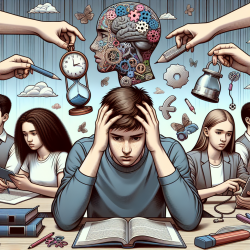The teenage years are a critical period for cognitive development, yet many high school students face challenges that can hinder their academic performance and overall well-being. A recent study titled "Perceived Cognitive Impairment in High School Students in the United States" sheds light on the prevalence of cognitive difficulties among adolescents and offers valuable insights for practitioners aiming to improve their support strategies.
The Scope of Cognitive Impairment
The study conducted by Iverson et al. (2022) involved over 8,000 high school students who participated in the Youth Risk Behavior Survey (YRBS) by the Centers for Disease Control and Prevention (CDC). The results were eye-opening: 38% of students reported serious difficulties with concentration, memory, or decision-making due to physical, mental, or emotional problems. Notably, girls reported higher rates of cognitive impairment (45%) compared to boys (30%).
Factors Contributing to Cognitive Impairment
The research identified several factors associated with perceived cognitive impairment:
- Mental Health Issues: Depression and suicidality were strongly linked to cognitive difficulties.
- Lifestyle Factors: Insufficient sleep and lack of physical activity were significant predictors of cognitive challenges.
- Psychosocial Adversities: Experiences such as bullying, feeling unsafe at school, and exposure to violence were correlated with higher rates of cognitive impairment.
- Substance Use: The use of illicit drugs was also a contributing factor.
Strategies for Practitioners
Given these findings, practitioners can take several steps to support students experiencing cognitive challenges:
- Promote Mental Health Awareness: Encourage open discussions about mental health and provide resources for students struggling with depression or anxiety.
- Implement Sleep Hygiene Programs: Educate students on the importance of adequate sleep and offer tips for improving sleep habits.
- Encourage Physical Activity: Develop programs that promote regular exercise, which can enhance cognitive function and overall well-being.
- Create Safe School Environments: Work towards reducing bullying and violence in schools by implementing anti-bullying campaigns and providing safe spaces for students.
- Monitor Substance Use: Educate students about the risks of drug use and provide support for those seeking to quit.
The Role of Online Therapy Services
TinyEYE's online therapy services can play a crucial role in addressing these challenges. By providing accessible mental health support, speech therapy, and other interventions remotely, TinyEYE helps schools overcome therapist staffing shortages and ensures that students receive the help they need without delay.
The Importance of Further Research
This study highlights the need for ongoing research into the causes and solutions for perceived cognitive impairment among adolescents. Practitioners are encouraged to stay informed about new findings through conferences, publications, and webinars. Engaging with current research will enable educators and therapists to implement evidence-based strategies that effectively support student success.
To read the original research paper, please follow this link: Perceived cognitive impairment in high school students in the United States.










